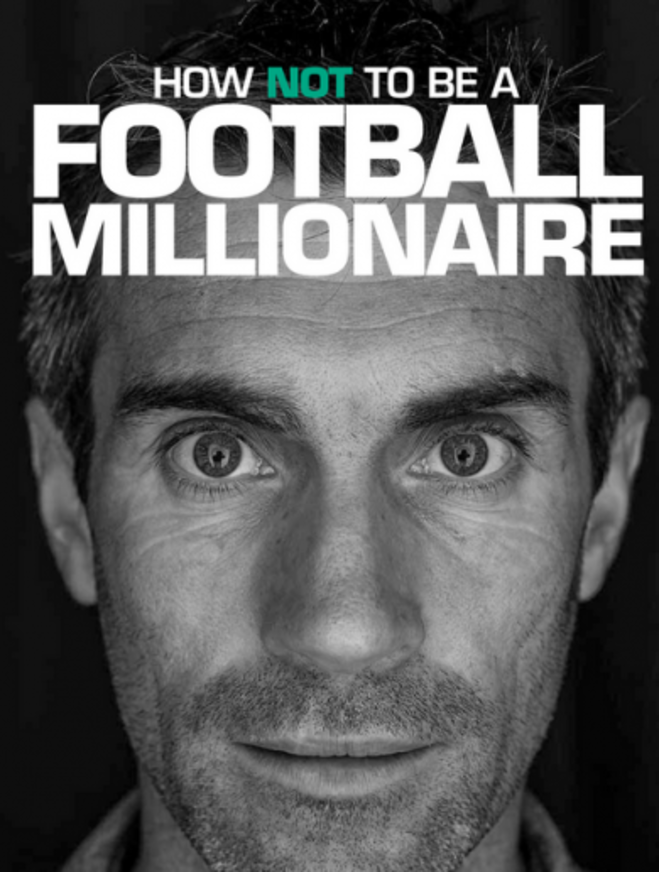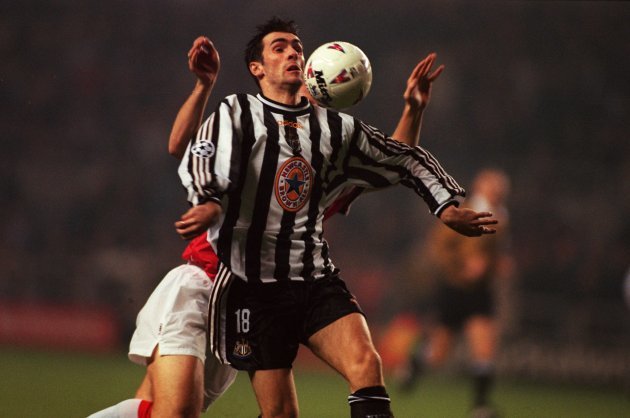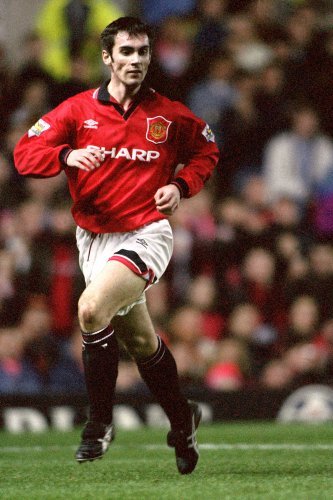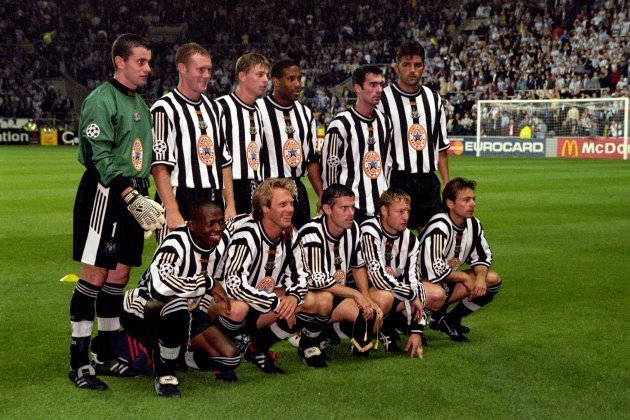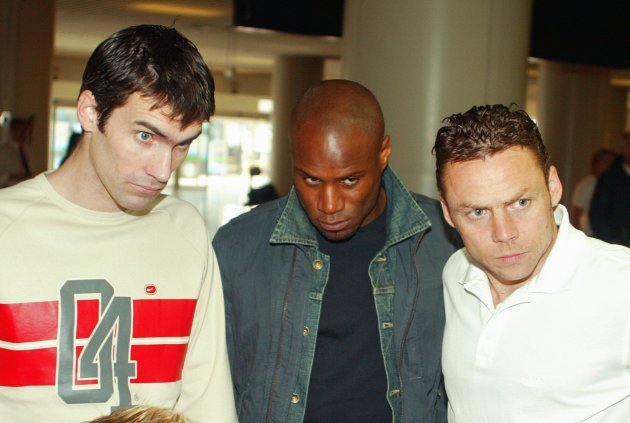MOST OF US have regrets, but Keith Gillespie has more than most. In many ways, the overriding story of his new autobiography, How Not to Be a Football Millionaire, is a familiar one — that of a young athlete, with too much time and money on his hands, seduced by the trappings of fame.
People often criticise footballers who behave badly or show a proclivity for excess but few of us know what it’s like to be in their shoes and even fewer have blown £8million (€9.5million) over the course of a couple of years.
Yet in 2010, largely owing to a longstanding gambling addiction, the former Northern Ireland and Manchester United player was declared bankrupt. Having experienced the dizzying highs that life as a well-known professional footballer invariably entails, he had now hit an all-time low. Just how had everything gone so wrong?
“I got into gambling at a very early age when I was at Man United,” he tells TheScore.ie. “Once that gets a hold on you, it’s very difficult, especially with the likes of me — I have an addictive personality. I sort of just got into it straight away. I loved the buzz of it all.“It’s very important, especially with the money the young players are earning now, to try to stay away from that side of things. It is very rife in the game. It is something that can get a hold of you. It’s important to manage your money in the right way. It’s a short career but there’s obviously a lot of riches there. I probably should have had a hobby like golf at the time, but for me, any spare time I had I spent gambling.
“People say it’s a mug’s game and it certainly is. But it’s something that got a hold on me and you obviously pay for it in the end.”
Gillespie’s emergence coincided with the onset of the Premier League era and the Sky Television-inspired boom in football in the early 1990s. Suddenly, players’ wages were at an unprecedented high and the Antrim native was one beneficiary of this transformation.
However, as is the case for any successful person, there were sacrifices that came with the territory. After moving from United to Newcastle as part of the £7million deal that brought Andy Cole in the opposite direction, Gillespie found himself somewhat isolated owing to the changes that this unfamiliar environment prompted. The boredom of this new existence caused his gambling to spiral out of control.
“When I signed for Newcastle, I was living in a hotel for the first five months. I’m in a new place, I don’t know anybody. You finish training at 12 or half 12 everyday. I’m going back to an empty hotel room, which can be quite lonely. The rest of the players could go back to their wives and kids. But I was 20 years of age and for me, boredom did take over. And that’s when I got really heavily involved in the gambling side of things.
“Playing for Newcastle, my pay had increased; I’d a lot more money, so my wages were spent in the bookies.”
(Keith Gillespie, pictured in his Newcastle days — Mike Egerton/EMPICS Sport)
The signs of his addiction were evident from early in his Newcastle career. The Sun published a story about how he had blown £47,000 in one impulsive day at the bookies, which was laconically dubbed ‘Black Friday’ — an incident that caused him to be the source of much amusement among his teammates and got him into trouble with the club’s hierarchy.
Yet what stands out in the book is how casually Newcastle ultimately treated this disconcerting incident. In it, he writes:
“The club never ordered me to stop gambling. There was no mention of going to Gamblers Anonymous or anything like that. I wouldn’t have admitted weakness anyway. I was blissfully in denial and didn’t really believe I had a problem. The gaffer said they wanted to treat me like an adult, so they left me be and that suited just perfectly.”
However, looking back, Gillespie insists he is not angry with his employers at the time for seemingly turning a blind eye to this issue.
“I don’t think the club knew to what extent I was gambling. They can’t stand over you all day. Once you’ve got phone betting available, I didn’t have to go into the bookies to put a bet on, so the club didn’t know to what extent I was gambling. They weren’t to know, because I wasn’t public about it. I was a young person and I made my own mistakes – it’s not their fault I got more involved in the gambling side of things.”
And betting heavily wasn’t Gillespie’s only vice. In the book, he writes: “It is true that footballers who stay faithful are a rare breed. Personally, I can’t say that I’ve encountered many.” And the 38-year-old, who has endured two failed marriages, was no exception.“At a club like Newcastle — a one-city club — you’re absolutely adored by everyone. There is a lot of temptation there and you get a lot of money at your disposal. Women would approach you and you’re just human at the end of the day. It’s just one of those things… A lot of players are unfaithful and you read about some of them in the paper.”
Perhaps this impulsive behaviour was inevitable though, when that same fearless mentality and brash self-confidence was yielding dividends on the football pitch.
He was spotted by Manchester United aged 12 and subsequently became part of the famous ‘Class of 92′ youth team that also included David Beckham, Paul Scholes and Gary Neville among others.
He developed rapidly and earned a place in the senior side in an FA Cup game against Bury while still a teenager, marking the occasion with a goal to boot.
(Keith Gillespie playing for Manchester United as a teenager — Neal Simpson/EMPICS Sport)
“The surreal thing for me was that a year and a half previous to that I had just left school,” he says. “So a year and a half after I graduated, here I was making my debut for Man United and scoring. You’ll never ever forget that first appearance scoring — and for the team I supported as well. I used to have these players’ posters on the wall, and now I was playing alongside them.”
Being a skillful young winger from Northern Ireland, Gillespie inevitably was compared to George Best. Yet he claims he was never affected by such hype.
“Not at all. I think the George Best thing comes a lot for any young Northern Ireland player who goes to Old Trafford. Even Norman Whiteside, who was a totally different player to the one George was, got it. Maybe there were more similarities with me, as we were both wingers and dribblers. But that happens to a lot of young footballers coming from Northern Ireland.
“Maybe if it didn’t happen to people in the past, there would have been a bit more pressure. But I just took it on the chin and got on with it — there was no real pressure on me. George Best was a really good player, so it was nice to be mentioned in the same breath as him.”
Yet while he ostensibly could cope with the level of expectation surrounding him, life as a young footballer was hardly problem-free.
“It is daunting to leave home at 16. It’s a little bit different for players who actually live in England — they might live in Birmingham and they’re moving to Manchester, but it’s not far for them to get home if they want to see their family, whereas I have to jump on a plane to get home. I’d go every six weeks for long weekends, so you look forward to those times. But it was something I knew I had to do. I wanted to be a professional footballer. You’ve got to make that sacrifice. You’re always going to miss home, but I had to get over that. And I wasn’t too homesick.”
And the subsequent phenomenal success he enjoyed may never have occurred in the first place had others got their way. Gillespie attended Bangor Grammar School in which, as he writes, “rugby was king”. Unhappy at the prospect of losing this talented young athlete to another sport, the school tried to persuade him to play rugby, and when he didn’t comply, gave him Saturday morning detention to prevent him from attending his soccer matches.
Yet Gillespie refuses to hold a grudge, and the school have belatedly shown their appreciation for his footballing prowess.
“I’ve been back to the school since — they actually play football now, which is quite strange. I’ve spoke to the current headmaster — a different headmaster from my time there — and he says they’re very proud that I went to the school and they have a photograph of me up in the library. It’s nice to be remembered like that.
“It was a difficult time,” he adds, reflecting on his youth. “I’d signed for United when I was 13. Thankfully, I had my family behind me and they knew I was doing the right thing by not turning up for rugby. The school should have been honoured when somebody who had signed for Man United went there, and it’s disappointing football wasn’t played there back then and I wasn’t given more encouragement.”
[Newcastle United team group photo ahead of their Champions League tie with Barcelona. (top l-r) Shay Given (goalkeeper), Steve Watson, Jon Dahl Tomasson, John Barnes, Keith Gillespie and Philippe Albert. (front l-r) Faustino Asprilla, Warren Barton, Rob Lee, David Batty and John Beresford.]
Yet Gillespie was given his first taste of the harsh nature of professional football, when the club he supported and spent his early playing days at, decided to cast him off as a makeweight in the Cole deal. Manager Alex Ferguson was reluctant to sell his promising young winger at the time, nonetheless Newcastle refused to listen to offers for their English striker’s services, unless Gillespie was thrown in as part of the deal.
But despite leaving his boyhood club, who would go on to enjoy success after success in his absence, he says he has no regrets about departing United.
“I went to a great club like Newcastle and had a fantastic time there. We came so close to winning the Premiership. It’s something I always say that if you ask somebody who came second in the league two or three years ago, they’d struggle to remember, whereas I think everybody remembers Newcastle in 95/96. It shows what a good team we were and how entertaining we were that people still remember that. It’s a testament to Kevin Keegan and the way he had us drilled and playing football. It was a special time to be involved there.”
While a significant number of high-profile players have left Old Trafford on bad terms over the years, Gillespie has nothing but kind words for the club and in particular, Ferguson, who acted as his agent in the Newcastle transfer.“I first came across him as an apprentice and he was nothing but brilliant to me as my agent when I was signing for Newcastle. He spoke to my mum and told her that he would get the best possible deal for me and he did that. So I’ve got nothing but good memories of him.”
Ferguson’s negotiation skills ensured Gillespie’s wages increased substantially. Having been on £250 a week at Manchester United, he agreed a deal that would see him earn £1,200 a week at Newcastle, with a £175,000 signing-on fee to be paid in installments over the four years of the contract.
It’s hardly a surprise that Gillespie, then only 20 years of age, wasn’t exactly intent on setting up a savings account or playing it safe after being given such a lucrative contract.
Ironically though, initially at least, his excessive lifestyle coincided with the period in which the star believes he played the best football of his career.
“You’re still young and you’re coming in and training every day, and [the alcohol] doesn’t have the same effects as when you’re a little bit older,” he explains. “It’s something that has always been rife in football — the drinking side of it. David Ginola, when he signed and went down the quayside of Newcastle, couldn’t understand [the excess drinking], but he grew to understand it. He grew to be a part of it, because we had our special bond among our teammates at Newcastle.
“We had it every few weeks where everybody would go out. It’s something that will always be a part of football. It might be a bit different on the continent. But I think it’s something that’s always going to be involved in the British game.”
YouTube credit: Mark Ashworth
Interestingly, he also believes suggestions that this drinking culture no longer exists in football are wide of the mark, and that players remain as prone to excess as ever.
“I don’t see any reason why it wouldn’t [still exist]. You’ve obviously got the social networking sites where it can be a problem for players who just want to let their hair down. But at the end of the day, they’re human beings, so why should they not be allowed to go for a night out and get drunk here and there?
“It’s something you need to do at times. There’s a lot of pressure involved in football and you need to relax and unwind. And if that involves going out and getting drunk, then so be it.”
If anything, he says that the occasional drinking session has a positive impact on players and specifically, their morale and camaraderie around one another.
“You always hear about clubs going away on bonding trips. And that always involves going out for a drink and having a laugh. That’s something that still happens now. I think it’s great that they do that, because when you’re at clubs now, everybody lives everywhere and you see players at training, but you don’t get to know them too well off the pitch. They are the times when you do get to know people, when you’re having a drink and unwinding.”
Others, most notably Roy Keane, might disapprove of this somewhat relaxed approach to life as a professional athlete. Indeed, one imagines the notoriously antagonistic young Keane clashing with his fun-loving fellow Irishman in their days together at United, nevertheless Gillespie says he always had the utmost level of respect for the current Ireland assistant boss.
“I played with him a few times,” he recalls. “I was in and around the first team. He’s a very likeable character. He’s one of the best players of his generation and an Irish icon. I think it’s fantastic that he’s Ireland assistant manager. A lot happened in 2002 [in Saipan], but it’s great that they’ve got past that, because a lot of players look up to him.
“He’s demanding because he wants to be the best. That’s a great trait to have. You didn’t want to give the ball away because you knew you’d be on the end of a right rollicking. You took care of your passing and he was a great player because of that.”
And like Keane, Gillespie is no stranger to controversy. In 2004, during a mid-season team-bonding trip in Spain with Leicester, he was arrested — along with teammates Paul Dickov and Frank Sinclair — after being accused of rape. The claims arose after an innocuous encounter and subsequent argument with two girls in the hotel in which the team were staying.
(From left, Keith Gillespie, Frank Sinclair and Paul Dickov, check-in for a flight back to the UK at Alicante airport — the trio were released from prison without charge in 2004 after being accused of rape amid a Leicester City mid-season trip to Spain)
In the end, the allegations were dismissed, and Gillespie and his teammates were absolved of any wrongdoing, yet they still were forced to endure the unsettling experience of having to spend a week in a Spanish prison.
“Going through something like that was the worst time of my life,” he says. “To be accused of such an awful crime was very difficult and what made it more difficult was being in a foreign country. If these allegations happened in England, I felt we’d have spent no time in prison whatsoever. It was just one of those times where you had to remain strong and believe in the Spanish judicial system. It took longer than we thought, but going through such a harrowing experience as we did, I think we all came out stronger people in the end.
“I wrote a lot about that in the book because it is something that I wanted everybody to know the full extent of. People hear the story and they always think no smoke without fire but that certainly wasn’t the case with this. There is absolutely no truth whatsoever in the allegation. It was an awful time for myself and for my family.”
While Gillespie recovered from the events of this trauma, Leicester arguably didn’t, as they were relegated later that season. He eventually returned to the Premier League with Sheffield United, before winding down his career firstly at Bradford, and then returning to Ireland. During this time, he had stints with both Glentoran and Longford Town, and Gillespie believes the standard of Irish football is often underestimated.
“Obviously there’s a huge gulf with football in Ireland as opposed to football in the Premier League. But you look at people who have played there like Kevin Doyle, Shane Long and James McClean — there are a lot of players who emerge from that league and go across the water to do very well. So it is a good standard and I was pleasantly surprised.”
Looking back on his career, it may come as a surprise to those who believe international football to be little more than an inconvenient irrelevance nowadays that Gillespie — in addition to making his debut at United — considers playing for Northern Ireland to be the highlight of his career. And the fact that he is sixth on the all-time appearance list with 86 caps suggests this is no exaggeration.
“For me, there is no bigger accolade than playing for my country. People will say ‘it’s only Northern Ireland’ but it’s my country and it was always 110% playing for Northern Ireland — I’m very patriotic.”
After announcing his retirement earlier this year following an injury-ravaged spell at Longford, he now says that a career in the media is “something I’d like to get into”.
Moreover, having undergone therapy to address his gambling issues, Gillespie says he is in a much happier place these days.
“It was very therapeutic writing the book, because everything’s out there and I wanted the credibility of everything being out there — people reading it and knowing there’s nothing missing. My ghostwriter’s done a fantastic job with it. It’s a book from which I’ve had a lot of good feedback and that’s what I’m pleased about most.”
How Not to be a Football Millionaire by Keith Gillespie is now available to buy. More details here.
